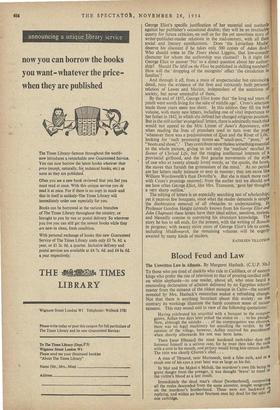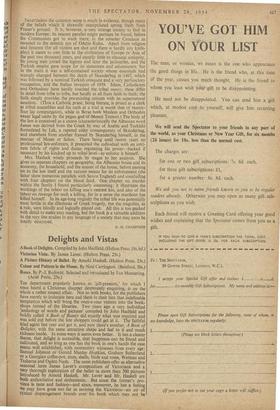Blood Feud and Law
The Unwritten Law in Albania. By Margaret Hasluck. (C.U.P. 30s.) To those who are tired of sheikhs who ride in Cadillacs, or of eastern kings who prefer the rite of television to that of pouring curdled mil!‘ on white elephants—to one reader, above all, who once heard a resounding declaration of atheists delivered by an Egyptian school., master from the minaret of the oldest mosque in Cairo—the society revealed by Mrs. Hasluck's researches makes a refreshing change. Not that there is anything luxuriant about this society; on the contrary its workings illustrate the harsh common sense of moult' taineers. This may sound odd in view of the following quotations: Having celebrated his acquittal with a banquet to the compur• gators, Asllan two days later yoked the stolen ox . . . to his plough* Now, although the mistake . . . of the compurgators was obvious, there was no legal machinery for annulling the verdict. In the opinion of the village, however, Asllan received his punishment when shortly afterwards his son was born lame.
There [near Elbasan) the most hardened oath-taker dare not forswear himself in a serious case, for he must then take the oath with a coin in his mouth, and perjury would bring him certain death. The coin was clearly Charon's obol . . .
A man of 'remove, near Martanesh, took a false oath, and as a result one of his eyes a year later was as large as his fist. In Mat and the Malesi e Mande, the murderer's own life being in grave danger from the avenger, it was thought 'brave' to tread in the victim's blood as a last insult.
Nevertheless the common sense is much in evidence, though many of the beliefs which it shrewdly manipulated spring fresh from Frazer's ground. It is, however, a very strange society to find in modern Europe; its nearest parallel might perhaps be found, before the Communists got to work there, in the remoter Caucasus as revealed to the ecstatic eye of Odette Kuhn. Apart from religion and firearms (for all victims are shot and there is hardly any knife- play) it seems to owe little to the civilisation of Europe or Asia of the past two thousand years, and equally little to classical antiquity. Its young men joined the legions and later the janissaries, and the Turkish empire gave scope for its statesmen and adventurers, but in the main it was a self-contained society whose essentials had scarcely changed between the death of Skanderbeg in 1467, which was followed by a nominal Turkish conquest and a very perfunctory occupation, and the Italian invasion of 1939. Islam, Catholicism and Orthodoxy have hardly touched the tribal mores; these differ in detail from tribe to tribe, but hardlj, at all from faith to faith; the faith simply provides the pre-existing custom with its supernatural sanction. (Thus a Catholic priest, being literate, is prized as a clerk at tribal assemblies and his oath at a trial is worth that of twenty- four lay compurgators, while in Berat both Moslem and Orthodox swear legal oaths by the pagan god of Mount Tomorr.) The body of the law is conceived as a canon (characteristically the Albanian word kanutz was derived from the Greek by way of Arabic and Turkish) formulated by Lek, a reputed older contemporary of Skanderbeg, and elsewhere from another framed by Skanderbeg himself, in the manner of Moses or Solon. There being until recent years no professional law-enforcers, it presented the individual with an intri- cate fabric of rights and duties regulating his power—backed if necessary by his kindred up to tribal level—to enforce it himself.
Mrs. Hasluck wisely proceeds by stages to her analysis. She gives us separate chapters on geography, the Albanian house and its economy, the household, and the master of the house, before passing on to the law itself and the various means for its enforcement (the latter show numerous parallels with Saxon England) and concluding with four chapters on the blood feud. One chapter on murder within the family I found particularly interesting; it illustrates the workings of the taboo on killing one's nearest kin, and also of the taboo' on revenge for such a killing, for in a sense the murderer has killed himself. In its age-long virginity the tribal life was potentially most fertile in the dilemmas of Greek tragedy, but the tragedies, as a rule, were blindly and logically played out. All this is too packed with detail to make easy reading, but the book is a valuable addition to the very few studies in any language of a society that may soon be totally destroyed.
H. M. CHAMPNESS











































 Previous page
Previous page